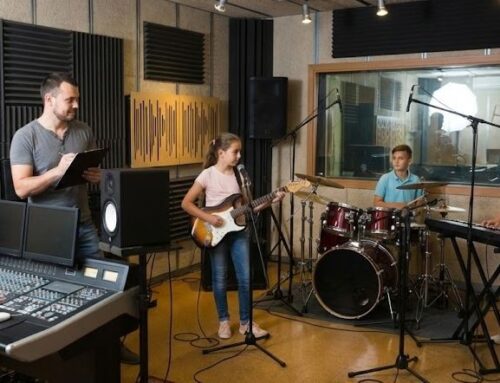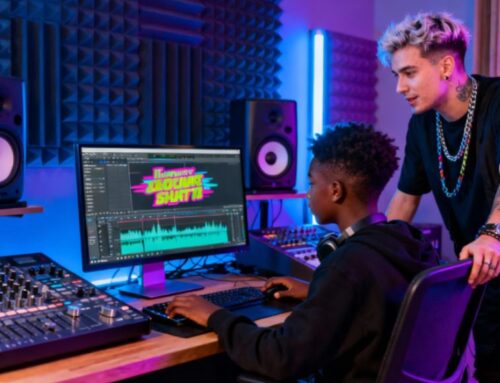Confidence is one of the most valuable traits a person can develop. It affects everything from personal relationships to career success. However, many people struggle with self-confidence and may not know how to build it effectively.
One of the most powerful and enjoyable ways to boost confidence is through learning an instrument. Whether you’re a child picking up your first guitar or an adult rediscovering the piano, music provides an incredible path to self-improvement. From achieving small goals to overcoming performance anxiety, playing an instrument fosters resilience, discipline, and self-expression.
In this article, we’ll explore the many ways learning an instrument can transform self-confidence and provide lifelong benefits.
At Capstone Music, we’re about building skills and confidence and we do that through music! More than “music lessons“, we play and grow with our students to support them in music and life! If you’re in Burlington, contact us to learn more!
1. The Power of Goal-Setting and Achievement
One of the first lessons in learning an instrument is understanding the importance of setting and achieving goals. Whether it’s mastering a chord progression, playing a full song, or performing in front of others, every step forward builds confidence.
As musicians work through lessons, they experience small victories, which reinforce a sense of accomplishment. Over time, these achievements build momentum, leading to greater self-belief.
???? Example: A beginner learning the piano starts with simple scales. After weeks of practice, they can play a short melody. This sense of progress fuels their motivation and self-confidence.
How to Apply This in Life:
- Set small, manageable goals (e.g., “I will learn one new song this month.”)
- Track progress to see how far you’ve come.
- Celebrate each milestone to reinforce a positive mindset.
2. Overcoming Challenges and Building Resilience
Every musician faces difficulties—whether it’s struggling with a difficult piece, missing a note, or feeling discouraged after a tough practice session. Learning an instrument teaches patience and perseverance.
Mistakes become part of the process, showing that failure isn’t an endpoint but an opportunity to improve. As musicians push through challenges, they develop resilience—an essential skill for confidence in all aspects of life.
???? Example: A guitarist struggling with barre chords might feel frustrated at first. But after consistent effort, they finally nail the technique, proving to themselves that persistence pays off.
How to Apply This in Life:
- View mistakes as learning experiences rather than failures.
- Keep practicing even when things get tough.
- Remember that progress takes time and effort.
3. The Confidence-Building Power of Performance
Performing music in front of others is one of the most effective ways to build self-assurance. Whether playing for family, friends, or an audience, stepping outside of your comfort zone strengthens confidence.
At first, stage fright might seem overwhelming, but the more a musician performs, the more comfortable they become. This ability to handle pressure translates to other areas of life, such as public speaking, job interviews, and social interactions.
???? Example: A student nervous about playing at a recital gains confidence after successfully performing their piece. The experience teaches them that they can handle pressure and perform well under stress.
How to Apply This in Life:
- Start small (play for close friends or family before performing publicly).
- Practice deep breathing techniques to manage stage fright.
- Remember that each performance makes you stronger and more confident.
4. Expressing Emotions Through Music
Confidence is closely tied to self-expression. Music provides an outlet for emotions, allowing people to communicate their feelings in a way words often cannot.
When musicians express themselves through their instrument, they build a deeper connection with their emotions. This self-awareness fosters confidence in personal identity and communication.
???? Example: A songwriter dealing with stress channels their emotions into lyrics and melody, creating a song that resonates with others.
How to Apply This in Life:
- Use music as an emotional outlet (play when happy, sad, or stressed).
- Experiment with different styles to find what resonates with you.
- Embrace creativity and let go of fear of judgment.
5. Social Connection and Support
Music is often a shared experience. Whether in a band, orchestra, or casual jam session, playing music with others fosters a sense of belonging. This social connection helps build confidence by providing encouragement, support, and shared growth.
Collaborating with fellow musicians also improves communication skills, teamwork, and adaptability—key traits of self-assured individuals.
???? Example: A shy student joins a music group and, over time, becomes more comfortable engaging with others and performing.
How to Apply This in Life:
- Join a music class or group to meet like-minded people.
- Support fellow musicians and celebrate each other’s progress.
- Step out of your comfort zone by participating in musical collaborations.
Dare to Transform Yourself
Learning an instrument is much more than a hobby—it’s a transformative experience that builds confidence in various ways. From setting and achieving goals to overcoming challenges and performing in front of others, musicians develop essential life skills that strengthen self-belief.
Whether you’re a beginner or an experienced player, every note played brings new opportunities for growth and self-assurance. So, pick up that instrument, embrace the journey, and let music help you unlock your full potential!






